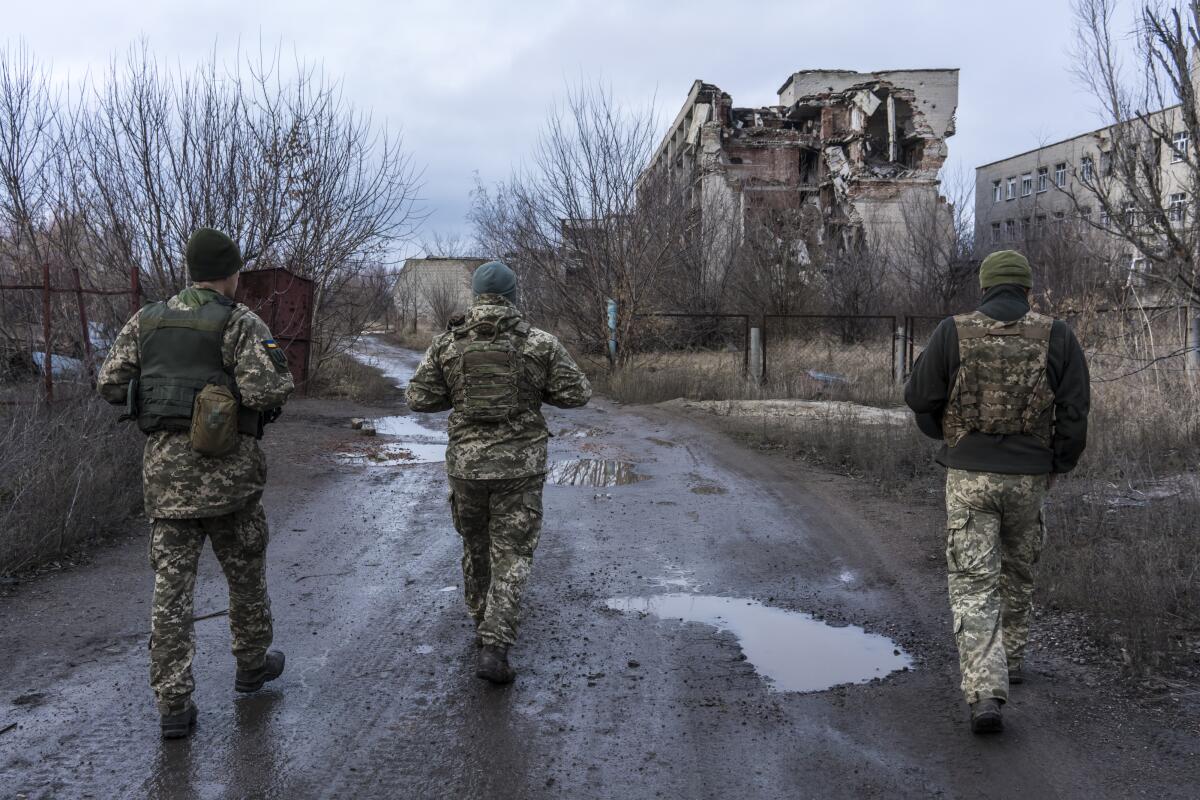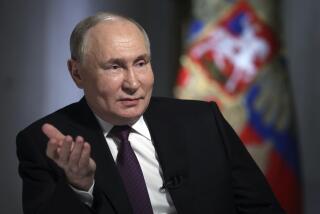Among ordinary Russians, little appetite for war in Ukraine

MOSCOW — Whatever Vladimir Putin may have in mind for Ukraine, an independent country he nonetheless considers part of the Russian motherland, ordinary Russians are expressing little enthusiasm for a shooting war to make their leader’s dream a reality.
For months, the Kremlin has been positioning tens of thousands of troops and heavy weaponry near Russia’s border with Ukraine, rattling nerves in a nascent democracy that saw a chunk of its territory — the strategic Crimean peninsula — snatched away in 2014.
Spurred by U.S. intelligence saying that Russia’s military moves could be setting the stage for another and far more consequential attack on Ukraine’s sovereignty, European leaders and President Biden have warned Putin of harsh economic consequences should he try to seize control of the onetime Soviet republic.
Even after one-on-one talks this week with Biden, and a round of diplomacy involving Europe’s most important leaders, Putin’s intentions toward Ukraine are far from clear.
Putin has written about the inseparability of Russia and Ukraine. Ethnic Russians living there, he wrote in an essay, “are being forced not only to deny their roots, generations of their ancestors, but also to believe that Russia is their enemy.”
Despite a constant stream of bellicose rhetoric from Russian state-controlled media about the supposed threat posed by a Ukraine portrayed as in thrall to the West, official stridency finds little echo in the streets, shops and cafes of a Moscow in winter’s grip.
“I don’t think it’s in Russia’s interest — any full-scale conflict in the modern world is unacceptable, especially with Ukraine,” said Natalia Zhigareva, 53, a design specialist in the Russian capital. “Whatever the media say, it’s still a friendly country to us.”
Public opinion suggests many Russians recoil from the idea of all-out war with Ukraine, with which Russia shares close cultural, historical and linguistic ties.
But Alexei Levinson, who works with the independent Russian pollster Levada, said some harbor the belief that Ukraine could somehow be co-opted without a real fight, in line with the precedent of the nearly bloodless seizure of Crimea.
While there is no question that Ukraine’s military is vastly outmatched by Russia’s, analysts say it’s also likely that Ukrainian troops — desperate and motivated by defense of their homeland — would be in a position to inflict painful casualties on Russian invaders, even if they could not hold them off for long.
Winter wars in this part of the world tend to be miserable slogs — as Napoleon, in the 19th century, and Hitler, in the 20th, could attest. Many Russians suspect, with good reason, that the government would be highly secretive about any combat fatalities in a war in Ukraine.
There are dwindling numbers of Russians with firsthand recollections of the Kremlin going to great lengths to conceal gruesome Soviet losses in Afghanistan, from which it made a humiliating retreat in 1989. But it’s harder to keep secrets in the social-media age, and any serious body count in a Ukraine fight “could, for some people, harken back to those days,” said Andrea Kendall-Taylor, a senior fellow and Russia expert at the Center for a New American Security.
For many, the prospect of young Russian troops being killed and maimed for a dubious cause is deeply troubling — sometimes in ways that hit close to home.
“The thing is, my son is 18 now, and he can be enlisted despite the fact that he’s a university student,” said Ilya Zikeev, a 39-year-old engineer who lives near Moscow. “I get very worried.”
The lack of public appetite for a potentially costly military seizure of Ukraine might give Putin pause, but analysts said it would be unlikely to deter him. Public sentiment is “important to him, but he wouldn’t be restrained by it,” said John E. Herbst, a former U.S. ambassador to Ukraine.
Kendall-Taylor also said Putin might view public opposition as manageable, at least in the short term — especially since his government, in the run-up to parliamentary elections this year, orchestrated a massive crackdown on civil society groups and opposition leaders.
“There’s not much space for people to express discontent,” she said.
Despite Putin’s pugnacious military signaling — U.S. intelligence said if he wanted to move against Ukraine in the early weeks of the new year, he could have 175,000 troops in place by then — he and his allies have been careful to paint Ukraine as the true aggressor.
“Putin would do everything to sugarcoat this military action as a peacekeeping mission — an effort to protect Russian citizens,” said Orysia Lutsevych, a Russia expert at the British think tank Chatham House, referring to Moscow’s issuance of passports to hundreds of thousands of ethnic Russians in eastern Ukraine.
Russian-backed separatists in Ukraine’s industrial east have been waging a war of attrition with Ukrainian troops, a conflict that has killed some 14,000 people.
Putin would hardly be the first leader to make use of a foreign conflict to turn attention away from nagging domestic problems, such as the COVID-19 pandemic raging largely unchecked, and Russians’ discontent over price hikes and stagnating wages.
Many Russians, including 30-year-old telecommunications manager Alexei Kalinkin, see cynical political motivation behind the combative tone struck by Putin’s allies.
“They’re saying that enemies are everywhere, and our president is the only one who can protect us,” Kalinkin said. “Because they have to raise his low ratings!”
Many longtime Putin-watchers believe he sees a conquest of Ukraine as a way to redress, at least in part, the wounding 1991 breakup of the Soviet Union, which the Russian leader sees as a historic catastrophe.
“His intention is to create a certain tier of countries that will be under open or coerced control — in a way, to re-create the Soviet empire,” said Lutsevych. “This would be his legacy.”
Already, the Ukraine drama has dragged on long enough that some Russians are simply tuning it out.
“I don’t care much,” said Oleg Mikhailin, a 46-year-old public utilities worker.
Even so, he said, he checks on the news about Ukraine occasionally — “just to see if something completely crazy is going to happen.”
Special correspondent Kolotilov reported from Moscow and Times staff writer King from Washington.
More to Read
Sign up for Essential California
The most important California stories and recommendations in your inbox every morning.
You may occasionally receive promotional content from the Los Angeles Times.










